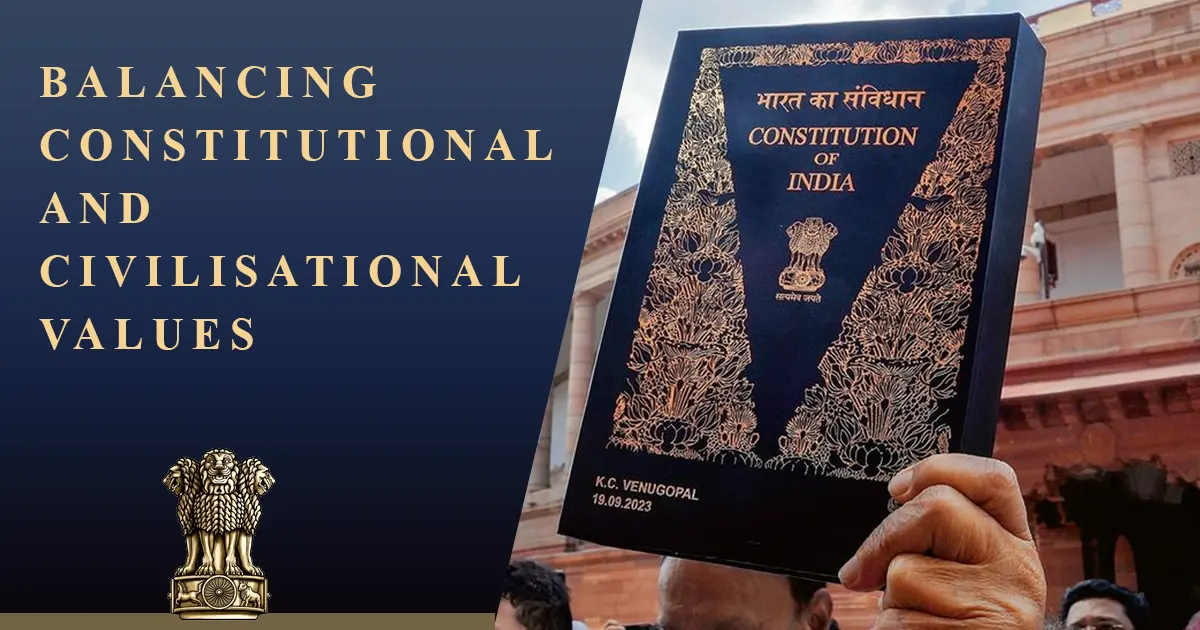
Context
On Constitution Day, the Prime Minister emphasized the Indian Constitution as a “living, continuously flowing stream,” prompting reflection on whether it remains rooted in colonial legacies or embodies India’s civilisational ethos.
Key Features of India’s Constitution
- Living Document
- The Constitution adapts and evolves in response to the aspirations of a dynamic and diverse nation.
- Civilisational References
- The Constituent Assembly debates acknowledged India’s 5,000-year-old civilisational history, emphasizing values like diversity, tolerance, and unity.
- Guiding Principles
- Nehru’s Objective Resolution and contributions from leaders like Syama Prasad Mookerjee underscored a balance between ancient traditions and modern governance.
- Global Best Practices
- The Constitution integrates parliamentary democracy, federalism, and fundamental rights, tailored to India’s unique socio-political conditions.
Constitution as a Living Document
- Unity in Diversity
- It governs a pluralistic society while safeguarding civilisational values such as tolerance and inclusivity.
- Modern State Building
- Facilitated India’s transition from colonial rule to a republic with elected representatives and a codified framework of rights and duties.
- Balance of Power
- Ensures separation of powers among the legislature, executive, and judiciary, promoting accountability.
- Rule of Law
- Establishes governance based on justice, liberty, and equality.
- Flexibility
- Its adaptability is reflected in the numerous amendments made to address contemporary challenges.
- Reflection of Dharmic Traditions
- The Constitution incorporates India’s ancient ethos of religious tolerance and justice.
Constitution as a Colonial Legacy
- Continuation of Colonial Structures
- Some view the Constitution as a continuation of colonial ideologies disguised as constitutional morality.
- Civilisation vs. Constitution Debate
- There is ongoing tension between preserving India’s civilisational identity and adhering to Western constitutional frameworks.
- Misinterpretation of Secularism
- Secular governance is often misinterpreted as undermining traditional cultural and religious values.
- Civic Nationalism
- Replacing indigenous values with Western ideals has weakened India’s civilisational memory.
- Incomplete Decoloniality
- Political independence did not fully decolonize the Indian psyche or governance structures.
Way Forward
- Strengthen Civilisational Consciousness
- Integrate India’s cultural ethos with constitutional principles to foster unity without compromising diversity.
- Balanced Reforms
- Address colonial remnants in governance while preserving the Constitution’s core values.
- Promote Constitutional Literacy
- Educate citizens about the spirit and intent of the Constitution to dispel misconceptions and build respect for democratic institutions.
- Inclusive Policy Making
- Ensure equitable representation of all communities, including indigenous groups, in democratic processes.
- Learning from Best Practices
- Draw lessons from historical examples like the Irish Free State and American democracy, while recognizing India’s indigenous democratic traditions, such as Adivasi governance systems.
- Comparative Secularism
- The Hindu Mahasabha’s 1944 Constitution, which rejected the concept of a state religion, aligns with India’s secular framework and offers insights into balancing religion and governance.




